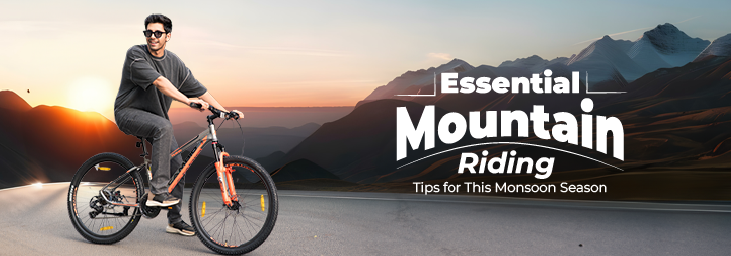Summer is passing by fast, & soon, we will find ourselves in autumn. In between comes the monsoon. With the earthy smell of soil, the first drops of blue, that vibrant look on trees, and the grandeur of thunder & lightning, the rainy season is truly a sight to behold.
Moreover, rain adds an extra touch to a usual ride on the hilltops or paths behind your house or around your city. Rain makes riding in the mountains more exciting. Mountain biking in the rain is also beneficial in terms of improving mountain biking techniques.
Getting acquainted with biking in the rain requires some time and practice, but riding in wet conditions can be a delightful experience when you become a pro. A cycle ride during the monsoon season is fun, but you must be careful. Here are safety tips for your monsoon ride in the mountain to the core.

1. Keep Your Mountain Bike in Prime Condition
In addition to dusting your mountain bike before you go, it’s as important to wipe it down with a clean cloth after you’ve finished riding in the rain. After a ride, your bike will undoubtedly be even dirtier. The straightforward explanation is true: your mountain bike’s tires could get covered with mud or filthy water after riding through damp terrain.
The greatest approach to show your bike some love and care is to give it a good cleaning after a fulfilling ride. If the stagnant mud is not cleaned up, it can damage your bike’s paint and cause corrosion.
2. Maintain Proper Tire Pressure
Riding can be affected by tire pressure. Variations in tire pressure might impact how your bike reacts to your maneuvers. To thoroughly understand how to alter tire pressure during rainy seasons, you may visit local bicycle stores or conduct an online search for the optimal tire pressure.
You should maintain the recommended tire pressure according to the size of your mountain bike tires. If necessary, lower the pressure. A damp road can reduce the friction between the tarmac and the tires. Lowering the pressure by a few PSI can help restore lost traction and improve the smoothness of the ride.
3. Improve Your Vision
Rain can impact your vision when riding. In addition, mountain bikes require more time to stop after engaging the brakes in rainy circumstances.
Keeping your vision and sight clear is crucial when driving, whether you use glasses or not. Ensuring your eyes, sunglasses, or glasses are clean helps you see what is ahead. Similar to helmets, visors or eyewear can shield your eyes from branches, mud, and rain.
4. Be Gentle on the Brakes
When riding in the wet season, it’s essential to apply the brakes gradually. Applying forceful braking could cause your mountain bike to lose control. You risk losing control of your mountain bike if you brake too forcefully or mash the brake levers. Because there is less friction on wet surfaces, your bicycle may require more time, so try to engage the brakes early.

5. Never Change Directions aggressively
The same goes for gradually applying the brakes: abrupt direction changes increase the chance of slipping and skidding. Skidding occurs when there is less grip between the tires and the wet terrain. Thus, riding carefully and softly when changing directions is always recommended.
Additionally, use great care when navigating the curves. While on a dry stretch, it is acceptable to drive around the curves at regular speeds; you should use extra caution when riding your mountain bikes in a damp area.
6. Invest in a High-Quality Mountain Bicycle
It is imperative to emphasize this idea. The cost of a mountain bike in India varies according to several aspects, including features, number of gears, suspension, and tire size. Cambio bikes can meet all of your mountain biking needs. The cost of mountain bikes are competitive, emphasizing performance and quality at affordable costs. You can view a variety of mountain bike cycles by going to their website.


